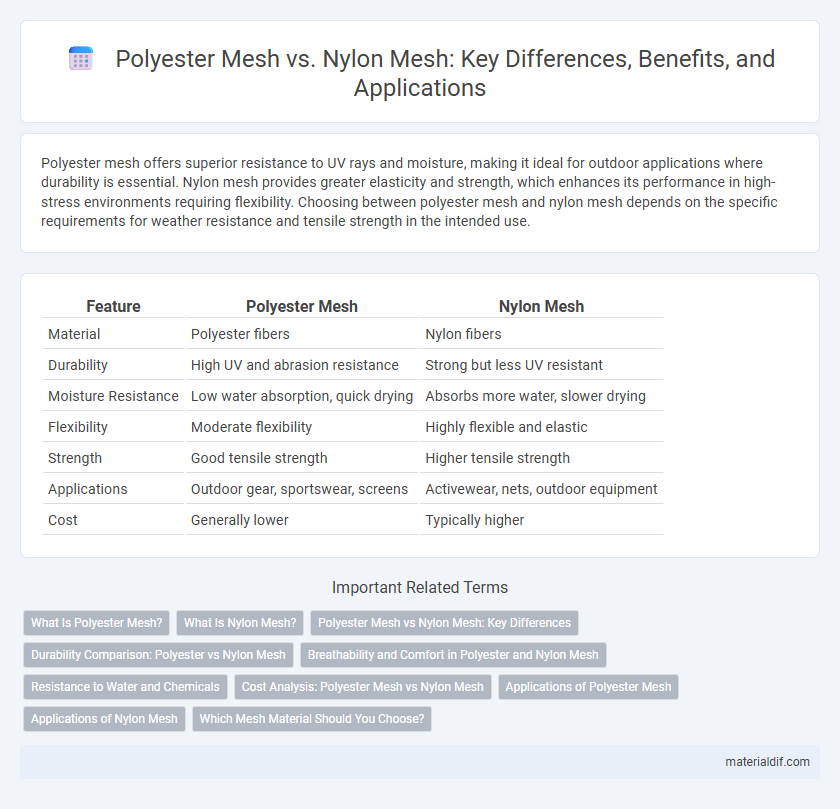Polyester mesh offers superior resistance to UV rays and moisture, making it ideal for outdoor applications where durability is essential. Nylon mesh provides greater elasticity and strength, which enhances its performance in high-stress environments requiring flexibility. Choosing between polyester mesh and nylon mesh depends on the specific requirements for weather resistance and tensile strength in the intended use.
Table of Comparison
| Feature | Polyester Mesh | Nylon Mesh |
|---|---|---|
| Material | Polyester fibers | Nylon fibers |
| Durability | High UV and abrasion resistance | Strong but less UV resistant |
| Moisture Resistance | Low water absorption, quick drying | Absorbs more water, slower drying |
| Flexibility | Moderate flexibility | Highly flexible and elastic |
| Strength | Good tensile strength | Higher tensile strength |
| Applications | Outdoor gear, sportswear, screens | Activewear, nets, outdoor equipment |
| Cost | Generally lower | Typically higher |
What Is Polyester Mesh?
Polyester mesh is a versatile synthetic fabric made from polyethylene terephthalate fibers, known for its durability, resistance to shrinking, and quick-drying properties. It offers excellent strength and moderate elasticity, making it suitable for applications like sportswear, bags, and outdoor gear. Compared to nylon mesh, polyester mesh provides superior UV resistance and less water absorption, enhancing its performance in outdoor and moisture-prone environments.
What Is Nylon Mesh?
Nylon mesh is a synthetic fabric made from polyamide fibers, known for its exceptional strength, elasticity, and abrasion resistance. It offers superior durability, making it ideal for applications requiring flexibility and resilience such as sportswear, bags, and industrial uses. Compared to polyester mesh, nylon mesh provides better moisture-wicking properties and quicker drying times, enhancing comfort and functionality in various environments.
Polyester Mesh vs Nylon Mesh: Key Differences
Polyester mesh offers superior resistance to UV rays, moisture, and mildew compared to nylon mesh, making it ideal for outdoor applications. Nylon mesh provides greater elasticity and strength, which benefits high-impact uses but tends to degrade faster when exposed to sunlight. The choice between polyester mesh and nylon mesh depends on the specific environmental durability and flexibility requirements of the project.
Durability Comparison: Polyester vs Nylon Mesh
Polyester mesh exhibits superior UV resistance and maintains strength after prolonged sun exposure, making it more durable than nylon mesh in outdoor applications. Nylon mesh, while offering higher tensile strength and flexibility, tends to degrade faster under moisture and UV light, leading to potential wear and tear. Therefore, polyester mesh is generally preferred for long-lasting durability in environments prone to sunlight and humidity.
Breathability and Comfort in Polyester and Nylon Mesh
Polyester mesh offers superior breathability due to its moisture-wicking properties, keeping the fabric dry and comfortable during extended wear. Nylon mesh, while durable and lightweight, tends to retain more moisture, which can reduce overall comfort in hot or humid conditions. The enhanced airflow in polyester mesh makes it a preferred choice for activewear and outdoor gear focused on ventilation and comfort.
Resistance to Water and Chemicals
Polyester mesh exhibits superior resistance to water and chemicals compared to nylon mesh, making it ideal for applications exposed to moisture and corrosive substances. Its hydrophobic nature prevents water absorption, which helps maintain strength and dimensional stability under wet conditions. Polyester's enhanced chemical resistance ensures durability in environments with exposure to oils, solvents, and acids, extending the lifespan of the mesh fabric.
Cost Analysis: Polyester Mesh vs Nylon Mesh
Polyester mesh typically costs less than nylon mesh due to lower raw material expenses and simpler manufacturing processes. Nylon mesh, while more expensive, offers superior durability and elasticity, which can justify higher initial investments in applications requiring long-term resilience. Choosing between polyester and nylon mesh depends on balancing upfront costs with performance needs and lifespan expectations in the specific use case.
Applications of Polyester Mesh
Polyester mesh is widely used in industrial applications such as screen printing, filtration, and sportswear due to its high resistance to UV rays, chemicals, and moisture. Its dimensional stability and durability make it ideal for outdoor use, including tents and banners where exposure to weather elements is common. Compared to nylon mesh, polyester mesh maintains strength and shape better under prolonged stress and exposure to sunlight, enhancing its suitability for heavy-duty and long-term outdoor applications.
Applications of Nylon Mesh
Nylon mesh is extensively used in industrial filtration, food processing, and aquaculture due to its high tensile strength, chemical resistance, and flexibility. Its fine mesh size and durability make it ideal for applications requiring precise particle separation and repeated exposure to moisture. Nylon mesh is also preferred in sportswear and outdoor gear manufacturing, offering breathable and lightweight properties essential for comfort and performance.
Which Mesh Material Should You Choose?
Polyester mesh offers superior UV resistance and durability, making it ideal for outdoor applications such as sports jerseys and screen printing. Nylon mesh, known for its elasticity and strength, excels in environments requiring flexibility and abrasion resistance, like athletic wear and bags. Choose polyester mesh for long-lasting exposure to sun and moisture, while nylon mesh suits high-flex and heavy-duty use cases.
Polyester Mesh vs Nylon Mesh Infographic

 materialdif.com
materialdif.com